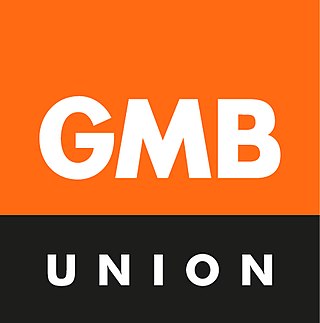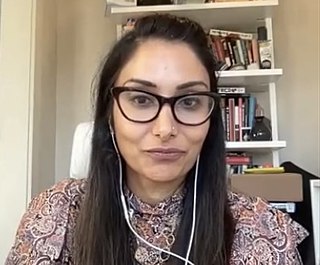
The GMB is a general trade union in the United Kingdom which has more than 560,000 members. Its members work in nearly all industrial sectors, in retail, security, schools, distribution, the utilities, social care, the National Health Service (NHS), ambulance service and local government.

Temporary work or temporary employment refers to an employment situation where the working arrangement is limited to a certain period of time based on the needs of the employing organization. Temporary employees are sometimes called "contractual", "seasonal", "interim", "casual staff", "outsourcing", "freelance"; or the words may be shortened to "temps". In some instances, temporary, highly skilled professionals refer to themselves as consultants. Increasingly, executive-level positions are also filled with interim executives or fractional executives.
The Transfer of Undertakings Regulations 2006 known colloquially as TUPE and pronounced TU-pee, are the United Kingdom's implementation of the European Union Transfer of Undertakings Directive. It is an important part of UK labour law, protecting employees whose business is being transferred to another business. The 2006 regulations replace the old 1981 regulations which implemented the original Directive. The law has been amended in 2014 and 2018, and various provisions within the 2006 Regulations have altered.
The digital economy is a portmanteau of digital computing and economy, and is an umbrella term that describes how traditional brick-and-mortar economic activities are being transformed by Internet, World Wide Web, and blockchain technologies.
The Consulting Association (TCA) was a controversial UK business, based in Droitwich, which, from 1993 to 2009, maintained a database of British construction workers and became implicated in a "blacklisting" scandal, which is ongoing. Revelations about the database resulted in the business being shut down, the Employment Relations Act 1999 (Blacklists) Regulations 2010, a Parliamentary enquiry, High Court actions leading to compensation payouts valued at between £50m and £250m in total, and a series of cases being brought to the European Court of Human Rights.
European labour law regulates basic transnational standards of employment and partnership at work in the European Union and countries adhering to the European Convention on Human Rights. In setting regulatory floors to competition for job-creating investment within the Union, and in promoting a degree of employee consultation in the workplace, European labour law is viewed as a pillar of the "European social model". Despite wide variation in employment protection and related welfare provision between member states, a contrast is typically drawn with conditions in the United States.
An employment contract in English law is a specific kind of contract whereby one person performs work under the direction of another. The two main features of a contract is that work is exchanged for a wage, and that one party stands in a relationship of relative dependence, or inequality of bargaining power. On this basis, statute, and to some extent the common law, requires that compulsory rights are enforceable against the employer.
The sharing economy is a socio-economic system whereby consumers share in the creation, production, distribution, trade and consumption of goods, and services. These systems take a variety of forms, often leveraging information technology and the Internet, particularly digital platforms, to facilitate the distribution, sharing and reuse of excess capacity in goods and services.
Deliveroo is a British online food delivery company founded by Will Shu and Greg Orlowski in 2013 in London, England. It operates in the United Kingdom, France, Belgium, Ireland, Italy, Singapore, Hong Kong, the United Arab Emirates, Kuwait and Qatar. It formerly operated in Germany, Taiwan, Spain, the Netherlands, and Australia.
A platform cooperative, or platform co-op, is a cooperatively owned, democratically governed business that establishes a computing platform, and uses a website, mobile app or a protocol to facilitate the sale of goods and services. Platform cooperatives are an alternative to venture capital-funded platforms insofar as they are owned and governed by those who depend on them most—workers, users, and other relevant stakeholders.
The Independent Workers' Union of Great Britain (IWGB) is a trade union in the United Kingdom. The IWGB comprises eleven branches which organise workers within their chosen industry, run their own campaigns and have their own representative officials. Their members are predominantly low paid migrant workers in London. The IWGB began as a breakaway from Unite and UNISON. The dispute stemmed from disagreements over how to get better working conditions for cleaners at the University of London, and, more broadly, about how to run modern trade unions. The IWGB is one of the main trade unions in challenging employment law relating to the 'gig economy'.

Uber BV v Aslam [2021] UKSC 5 is a landmark case in UK labour law and company law on employment rights. The UK Supreme Court held the transport corporation, Uber, must pay its drivers the national living wage, and at least 28 days paid holidays, from the time that drivers log onto the Uber app, and are willing and able to work. The Supreme Court decision was unanimous, and upheld the Court of Appeal, Employment Appeal Tribunal, and Employment Tribunal. The Supreme Court, and all courts below, left open whether the drivers are also employees but indicated that the criteria for employment status was fulfilled, given Uber's control over drivers.

Gig workers are independent contractors, online platform workers, contract firm workers, on-call workers, and temporary workers. Gig workers enter into formal agreements with on-demand companies to provide services to the company's clients.

Shannon Liss-Riordan is an American labor attorney. She is best known for her class-action cases against companies such as Uber, FedEx, and Starbucks. Liss-Riordan was a candidate in the 2020 United States Senate election in Massachusetts, unsuccessfully challenging incumbent Ed Markey for his senate seat.
California Assembly Bill 5 or AB 5 is a state statute that expands a landmark Supreme Court of California case from 2018, Dynamex Operations West, Inc. v. Superior Court ("Dynamex"). In that case, the court held that most wage-earning workers are employees and ought to be classified as such, and that the burden of proof for classifying individuals as independent contractors belongs to the hiring entity. AB 5 extends that decision to all workers. It entitles them to be classified as employees with the usual labor protections, such as minimum wage laws, sick leave, and unemployment and workers' compensation benefits, which do not apply to independent contractors. Concerns over employee misclassification, especially in the gig economy, drove support for the bill, but it remains divisive.

Veena B. Dubal is a Professor of Law at the University of California, Irvine School of Law. Her research focuses on the intersection of law, technology, and precarious work. Professor Dubal is widely cited for her scholarship on gig work.

Proposition 22 was a ballot initiative in California that became law after the November 2020 state election, passing with 59% of the vote and granting app-based transportation and delivery companies an exception to Assembly Bill 5 by classifying their drivers as "independent contractors", rather than "employees". The law exempts employers from providing the full suite of mandated employee benefits while instead giving drivers new protections:
Algorithmic management is a term used to describe certain labor management practices in the contemporary digital economy. In scholarly uses, the term was initially coined in 2015 by Min Kyung Lee, Daniel Kusbit, Evan Metsky, and Laura Dabbish to describe the managerial role played by algorithms on the Uber and Lyft platforms, but has since been taken up by other scholars to describe more generally the managerial and organisational characteristics of platform economies. However, digital direction of labor was present in manufacturing already since the 1970s and algorithmic management is becoming increasingly widespread across a wide range of industries.
The International Alliance of App-based Transport Workers (IAATW) is a global union federation of ridesharing and other gig transport workers.






